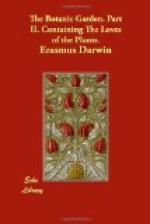Descend,
ye hovering Sylphs! aerial Quires,
And
sweep with little hands your silver lyres;
With
fairy footsteps print your grassy rings,
Ye
Gnomes! accordant to the tinkling strings;
5 While in soft notes I tune to oaten reed
Gay
hopes, and amorous sorrows of the mead.—
From
giant Oaks, that wave their branches dark,
To
the dwarf Moss, that clings upon their bark,
What
Beaux and Beauties crowd the gaudy groves,
10 And woo and win their vegetable Loves.
How
Snowdrops cold, and blue-eyed Harebels blend
Their
tender tears, as o’er the stream they bend;
The
lovesick Violet, and the Primrose pale
Bow
their sweet heads, and whisper to the gale;
15 With secret sighs the Virgin Lily droops,
And
jealous Cowslips hang their tawny cups.
How
the young Rose in beauty’s damask pride
Drinks
the warm blushes of his bashful bride;
With
honey’d lips enamour’d Woodbines meet,
20 Clasp with fond arms, and mix their kisses sweet.—
Stay
thy soft-murmuring waters, gentle Rill;
Hush,
whispering Winds, ye ruflling Leaves, be still;
Rest,
silver Butterflies, your quivering wings;
Alight,
ye Beetles, from your airy rings;
[Vegetable Loves. l. 10. Linneus, the celebrated Swedish naturalist, has demonstrated, that ail flowers contain families of males or females, or both; and on their marriages has constructed his invaluable system of Botany.]
25 Ye painted Moths, your gold-eyed plumage furl,
Bow
your wide horns, your spiral trunks uncurl;
Glitter,
ye Glow-worms, on your mossy beds;
Descend,
ye Spiders, on your lengthen’d threads;
Slide
here, ye horned Snails, with varnish’d shells;
30 Ye Bee-nymphs, listen in your waxen cells!—
BOTANIC
MUSE! who in this latter age
Led
by your airy hand the Swedish sage,
Bad
his keen eye your secret haunts explore
On
dewy dell, high wood, and winding shore;
35 Say on each leaf how tiny Graces dwell;
How
laugh the Pleasures in a blossom’s bell;
How
insect Loves arise on cobweb wings,
Aim
their light shafts, and point their little stings.
First the tall CANNA lifts his curled brow
40 Erect to heaven, and plights his nuptial vow;
[Canna. l. 39. Cane, or Indian Reed. One male and one female inhabit each flower. It is brought from between the tropics to our hot-houses, and bears a beautiful crimson flower; the seeds are used as shot by the Indians, and are strung for prayer-beads in some catholic countries.]
The
virtuous pair, in milder regions born,
Dread
the rude blast of Autumn’s icy morn;
Round
the chill fair he folds his crimson vest,
And
clasps the timorous beauty to his breast.




